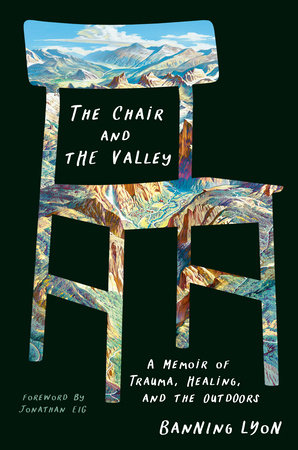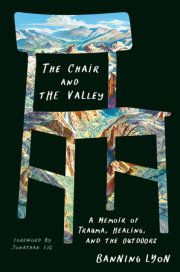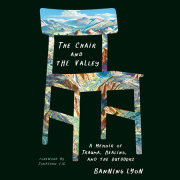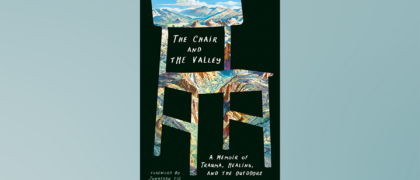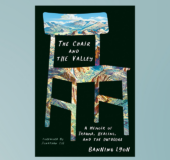Prologue
I was thirty-nine years old when I first saw Yosemite Valley. From the air, its jagged walls and granite spires somehow seemed older than the Earth itself. At one end of the valley stood Half Dome, its iconic summit surrounded by a blanket of snow, like a stone in the middle of a frozen stream. I pressed my face to the window of the plane and gazed at the valley below, the place that would become my home.
The man sitting next to me leaned forward and peered out the window.
"Ever been to Yosemite?" he asked.
"Not yet," I said.
To him, I probably looked like a normal guy, dressed in a pair of jeans and a T-shirt, my knees jammed against the seat in front of me. But I wasn't normal. I was the broken shadow of a person, a fourteen-year-old hiding in an adult's body, still waiting for my parents to pick me up at the airport after they abandoned me. Two years later they would sign me in to a psychiatric hospital operated by a corporation that would eventually plead guilty to the largest health care fraud case in the history of the United States.
The man next to me leaned back in his seat.
"Are you planning on going to the valley soon?"
"I'm flying out for a job interview," I said, "to be a backpacking guide."
His eyes grew wide. "In Yosemite?"
"Yeah, my interview's tomorrow."
I looked back out the window. I didn't like looking at people when I spoke to them. After having been forced to sit in a quiet room and stare at a wall for months at a time, I didn't trust people anymore. I couldn't count how many times I'd listened to my friends shriek and cry for help while the hospital staff held them down and strapped them to their beds. My fiancée had survived that place when she was a teenager too. Until years later, when her heroin addiction killed her, and almost killed me.
I was still staring out the window when the man spoke again.
"I haven't been to Yosemite in years," he said. "I'll never forget the first time I drove into the valley. I remember getting out of my car and thinking it was the first place that ever made me believe in God."
I didn't say anything, I just watched the valley below slowly drift into the distance. Four months later I'd see Yosemite in person-and it wouldn't make me believe in God. For the first time in my life, it would make me believe in myself.
1.
I Don't Want You
The journey that would lead me to become a backpacking guide didn't begin in a psychiatric hospital or Yosemite. It began in a small stucco house in the foothills of Sonoma, California, twenty-six years before, when my parents first sent me away.
I was born in Southern California, the son of a pilot and a travel agent who had gotten married just before the bloodiest years of the Vietnam War. Until I was eleven, my life seemed perfect. Dad took me on weekend trips around North America. We went hiking and sailing and sat under trees and ate lunch together. When he was home, we wandered through the hills near our house, searching under rocks and logs for snakes and lizards. Once, when I caught a five-foot-long gopher snake, Dad said we should take it home and show my mom.
"Look what we found today," he told her, smiling.
I pulled the snake out of a pillowcase and Mom screamed at the top of her lungs. Dad and I burst into laughter. Mom almost passed out.
It wasn't until after their bitter divorce and custody battle that Mom finally sent me and my older sister to live in Sonoma with my dad and stepmom, Linda. It was easy to like Linda, with her long blond hair and flight attendant smile, but she was in her late twenties and had never had kids. Even as a thirteen-year-old, I could tell she didn't know how to deal with two teenagers. By the time I'd started seventh grade, my sister Adrienne had gotten her driver's license. I hardly saw her again after that.
A year later, when Adrienne was a senior and ready to go to college, Linda and I began to argue. She'd ask me to do chores and I'd rush through them, only to have her ask me to do more. I'd always been free to do what I wanted before, so I pushed back. Halfway through the summer of 1985, Linda had had enough.
"I think you need to go back and live with your mom," she said. "You'll be happier there. Not to mention, she's always reminding us she still has full custody."
Before Dad married Linda, he was my best friend. We'd talk and laugh and work in the yard together. But after my parents' divorce, he seemed quiet and distant. He spent more time away. And when he was home, we only did things with Linda. He wasn't my dad anymore; he was her husband now. When Linda finally told me I needed to go live with my mom again, he walked out of the room as if he hadn't heard her.
"I don't want to live with Mom," I said, following him. "I want to live with you. I want to go hiking and catch snakes again. I miss you."
"Give her a call anyway, son," he said.
I was heartbroken. My dad was worse than dead; he was gone. I almost began to cry, but I didn't want him to see my tears. He didn't even look at me as he walked away.
I'll never forget watching him as he left that afternoon. I wondered why he had given up on me, why he refused to remember how close we'd been before he married Linda. The moment reminded me of something he once told me when I was younger, after we had stopped during a hike to rest in the shade of a tree. We were drinking water from his old metal canteen when I saw a plane overhead.
"Are you ever afraid of crashing, Dad?" I asked.
He shook his head and grinned, the way he always did when he was certain of something.
"Nope," he said. "Never. It doesn't even occur to me. I always imagine good things happening. There's no point in thinking about what could go wrong."
Since my parents' divorce, maybe that's all I was to my dad, something bad that had happened to him, a reminder of something that had gone wrong. But to me, our memories together were the happiest moments of my life. I couldn't understand why I was only a part of his past and not a part of his future.
I never knew why my parents divorced. My mom said he had cheated on her, but I didn't believe it. I didn't believe anything my mom said. I hardly knew her. I knew her parents had been poor and she grew up in the South, and now she ran a travel agency and she loved her Cadillac and her Rolex. But she didn't feel like my mom. She acted like an android that had been programmed to take care of me, with her short black hair and ice-blue eyes as mysterious as the glaciers I'd seen in Alaska. I knew she loved me, but only under the right conditions.
I called her the next day. She sounded happy to hear from me, although I didn't know why.
"Linda said I need to come live with you," I said.
"Honey, I'd love that, but I don't have room for you. I live in a tiny condo in Newport Beach now. I only have one bedroom. You're thirteen. You need your own room."
"But Linda said I can't stay here," I told her. "She said you have full custody."
Mom didn't say anything. I peered around the corner of the kitchen and saw Linda sitting on the sofa, listening to me. She smiled and gave me a thumbs-up.
"Why don't you talk to Linda?" I said to Mom, tears filling my eyes.
"I don't want to talk to her," she snapped. "Tell them I don't have room for you."
Week after week Linda asked me to try again. I'd stand in the kitchen, tethered to our wall-mounted phone, and dial Mom's number while I leaned against the wall to hide my shame. But no matter how many times I called, nothing ever changed. Linda would tell me to call again, then she'd sit in the living room and eavesdrop after Dad left the room. Mom always said the same thing, like her circuits were broken.
"I don't have room for you, honey."
Finally, weeks later, angry and tired of the phone calls, Mom told me to fly to Dallas to stay with my aunt and uncle until she could join me there. I'd gone to visit them once when I was a child. Other than that one trip, the only thing I remembered about Texas was the blistering summer sun.
It was July when my uncle Dave stood waiting for me at the Dallas airport. He was tall and thin and had deep-set eyes and a solemn voice. We walked in silence together past the magazine stands and restaurants that lined the terminal. Then he patted me on the shoulder as if he were sorry for me, sorry that I didn’t have a family. Not because they had been killed but because they didn’t want me anymore.
Dallas was hot and humid and filled with houses built in flat rows bordering straight streets, like an enormous suburban waffle iron. Neighbors stood in their yards every evening and watered the grass, their shadowed figures backlit against a huge sunset and open sky. My aunt and uncle and their two daughters agreed to take care of me until Mom could sell her condo and move to Texas. My first week "living under their roof," as my uncle Dave called it, consisted of church four times a week, a blessing before every meal, and a fifteen-minute prayer circle before bed.
The only things that felt familiar were my uncle Dave's keepsakes from Vietnam. He had been a fighter pilot in the navy and flown alongside my dad over cities like Hanoi and Vinh and Thanh Hóa. His study was filled with memorabilia from the war. Every day I would wander to that quiet corner of the house and stare at the black-and-white photographs of him and my dad and the times they had shared. Dad looked so young, standing with his flight helmet under one arm and smiling at me from somewhere off the coast of Vietnam. I remembered the same photograph hanging in Dad's study when I was a little boy, but the image of him seemed different now. I felt like I'd lost him forever. Sometimes I'd take the picture off the wall and sit on the floor and cry while I stared at him and wondered why he had to marry someone who didn't want me.
I started eighth grade that summer, five months before my classmates and I would watch the space shuttle Challenger disintegrate on TV. Every weekday morning my older cousins drove me to school, and we'd ignore one another while I sat in the back seat and gazed out the window, at cars filled with smiling families who still had one another. Then I'd come home and do my homework and help my uncle Dave around the house before slinking off to my room. But none of it made any difference. We all knew I wouldn't be staying for long, and that no amount of chores or prayers would ever make us a family.
Mom called every week to check on me. She asked about Adrienne, but I hadn't spoken to her, and my dad and Linda hadn't called me since the day they sent me to Texas. When I turned fourteen that September, I waited by the phone for Dad to call me. He never did. I went to bed in tears.
By Christmas, I'd stopped looking at his picture.
I was doing my homework in my room one evening when Uncle Dave knocked on my door and handed me the phone.
"Hi, honey," Mom said. "I've got some good news. I'm moving to Dallas next month to live with your aunt Martha and uncle John." Martha was Mom's younger sister. "You can move there and live with me. We'll look for an apartment once I'm settled there and find a job."
Uncle Dave drove me and my few belongings over to meet Mom when she arrived a couple of weeks later. We pulled up in front of the house to see her sorting through a pile of clothing in the back seat of her Cadillac. She threw open her arms and I gave her a hug because I didn't want to disappoint her. I hadn't seen her since the day I'd moved to Sonoma, two years before, when I walked into her bedroom to say goodbye. I remembered sitting on the edge of her bed and putting my hand on her shoulder. She didn't say anything. She just lay there like a corpse wrapped in her thin cotton sheets. She used to cry all the time after Dad left. She even stopped talking for a while. As far as I was concerned, my mom had been gone for nearly three years.
Uncle Dave grabbed two bags of clothing out of her car and started for the house. Mom walked around to the trunk and dug through a box.
"Guess what I bought for you," she said, handing me a brand-new skateboard. "I remember how much you loved skating when you were a little boy."
I'd forgotten my old yellow skateboard and our brief love affair. Mom's gift conjured memories of skating barefoot and coasting around the street in front of our driveway. I wanted to be grateful, but it was hard to feel anything other than disappointment about my parents. I gave Mom another hug and began carrying my things inside.
Our room above Aunt Martha and Uncle John's garage was dusty and hot and too small for me and my mom, but my days of church and bedtime prayer circles were over. Mom worked all day and looked for apartments when she wasn't home. Uncle John lounged in his recliner and watched TV while Aunt Martha sat at the kitchen table, rereading her decades-old pile of tabloid magazines. Other than saying "Good morning" or "Good night," they only spoke to me if I was standing in front of their television.
I spent all my free time on my new skateboard, racing around in the Texas heat before retreating to the house, where I'd peel off my shirt, sit in the air-conditioning, and bury my face in the pages of a Thrasher skateboarding magazine. The black-and-white newsprint pages were crammed full of articles and pictures and artwork. Advertisements mocked parents. Skaters in wigs posed as worried moms wagging their fingers. There were ads for bands with names like Black Flag, Minor Threat, and Suicidal Tendencies. Every page read like an angry Declaration of Independence.
Copyright © 2024 by Banning Lyon. All rights reserved. No part of this excerpt may be reproduced or reprinted without permission in writing from the publisher.

